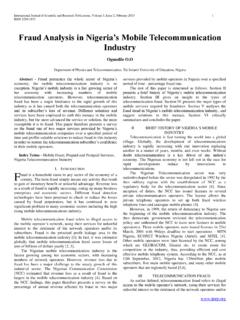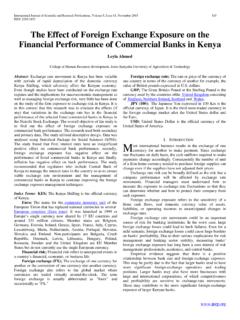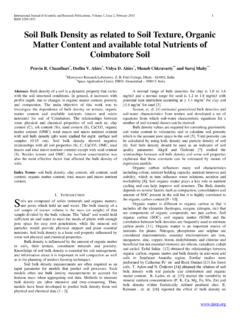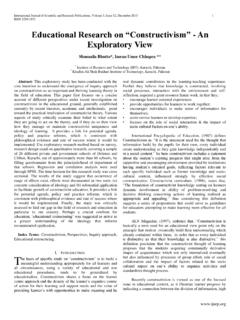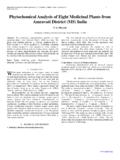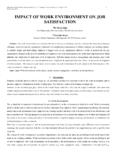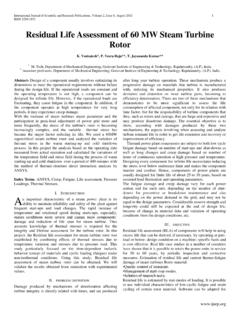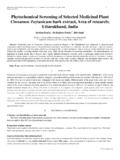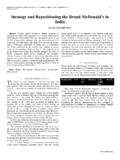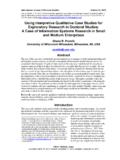Transcription of Challenges of Copying with Orphans and Vulnerable …
1 International Journal of Scientific and Research Publications, Volume 5, Issue 1, January 2015 1 ISSN 2250-3153 Challenges of Copying with Orphans and Vulnerable Children at Household Level: A Caregivers Perspective Lincoln Hlatywayo *, Faith Zimondi**, Nyatsanza Taurai** * Senior Lecturer: Disability Studies and Special Needs Education, Zimbabwe Open University ** Development Studies Researcher ** Student Advisor: Centre for Student Management, Zimbabwe Open University, Harare Region Abstract- This study is an analysis of the Challenges faced by care-givers in coping with OVC burden at household level. Using the quantitative and qualitative techniques the study was conducted among the rural care-givers in conveniently sampled wards in Gutu District of Zimbabwe.
2 The study was largely informed by the Psychosocial Support (PSS) Model- the wheel model by Tigere (2006) and the Ubuntu Theology by Tutu (1994) and Mbiti (1995) who advocated for the strengthening of social fabric through a communitarian approach rather than individualism in child care and support. Data was gathered through semi-structured questionnaires and in-depth community leaders were interviewed while 30 caregivers and 20 OVC completed questionnaires. The findings revealed that even in the face of severe socio-economic Challenges , there is continued willingness by families to absorb OVC.
3 In fact, some care-givers, particularly grandparents derive satisfaction from offering care and support. However, in spite of this willingness, the study found out that OVC care in families is fraught with several Challenges whose scale and complexity often exceed the capacity of families to effectively mitigate. Consequently, most of the needs of OVC are either partly addressed or not addressed at compound the Challenges , majority of the care-givers were middle aged group of aunties, widows, uncles, sisters and brothers predominantly depending on subsistence income. Although they were able to provide a secure environment for children, they were to a large extent unable to meet the OVC s psychosocial, social and basic needs.
4 with the resources at their disposal care-givers efforts were devoted to meeting the basic survival needs of OVC ignoring investment in initiatives like skills building that ensure long term survival and sustainability. Index Terms- Orphans , Vulnerable children, caregivers, family, household, Copying I. INTRODUCTION n the past decade Zimbabwe, like many developing countries has been severely affected by HIV and AIDS pandemic which has exceeded wars in terms of cumulative deaths, morbidity and social disintegration of families at household levels. The National AIDS Council (NAC) (20011:2) informed by the Census (2002) revealed that there are approximately Children in Zimbabwe of which children are Orphans .
5 The UNICEF National Strategic Plan for the Education of OVC girls (2005-2010) in NAC (20011:1) estimated that there are approximately 48 thousand child headed households in Zimbabwe housing approximately 100 thousand Children. Ministry of Health and Child Welfare (MoHCW) Centre for Disease Control and UNAIDS (2003:5) also revealed that about 165 thousand Children are living with HIV and AIDS which aggravate the Challenges of the care-givers to cope with the OVC problems at household level. In response to the escalated Challenges of OVC burden upon the care-givers at household level, Zimbabwe as a signatory to the United Nations Conventions on the Rights of the Child (UNCRC) promulgated governing policies for child care and support which include; The Zimbabwe Orphan Care Policy (1999), The Zimbabwe National AIDS Strategic Policy, National Action Plan For Orphans and Vulnerable Children (NAP for OVC) and National Gender Policy (NGP) to mention but a few.
6 However, despite the presence of these governing policies of child care and support there remains a gap regarding the capacitating and empowerment of care-givers at household level. It seems government policies are putting more emphasis on OVC relegating the care-givers who are also Vulnerable due to the escalated number of OVC. It is in light of this backdrop that this study sought to assess the Challenges and strategies for coping with the OVC problems at household level with special emphasis on care-givers in Gutu district of Masvingo Province in Zimbabwe. Problem Statement The government of Zimbabwe in partnership with non-governmental organizations is putting a lot of resources towards the care and upbringing of Orphans and Vulnerable children.
7 The same effort is not being put towards capacitating of caregivers of OVCs at household level, especially in rural areas. It is therefore essential to explore the Challenges faced by caregivers at household level and the Copying strategies they employ in the backdrop of the uneven distribution of resources. Objectives The following objectives underpinned the study i. To assess the Challenges faced by care givers in care and support of the OVC at household level. ii. To identify strategies adopted by care-givers to mitigate the Challenges they face in caring and supporting OVC at household level. Limitations The limitations of this study are predominantly premised on the nature, scope and research design employed.
8 There were I International Journal of Scientific and Research Publications, Volume 5, Issue 1, January 2015 2 ISSN 2250-3153 possibilities of non-cooperation by some informants such as Orphans who felt that they were being traumatized and care-givers who thought they may be victimized. However, to ensure cooperation the researchers exercised extra caution to persuade informants to be cooperative through seeking an informed consent and making them understand the purpose of this study. This study was carried out in only 6 (six) wards of Gutu District in Zimbabwe and therefore the generalisability of results is limited.
9 The use of non probability sampling techniques could also have affected the results despites the effort put to counter the related effects. II. LITERATURE REVIEW The Context of OVC Care and Support in Zimbabwe The UNAIDS (2003) in National Plan of Action For Orphans and Vulnerable Children (NPA for OVC) (2004:7) defined Orphans as children under the age of 18 years whose parent (s) have died, while Vulnerable children are children with unfulfilled rights. This definition is in line with the Zimbabwe National Orphan Care Policy (ZNOCP) (2000) which defines Orphans as those aged 0-18 whose parent(s) have died.
10 While Vulnerable children are defined as children with unfulfilled rights and mainly identified as follows: Children with one parent deceased (in particular the mother), Children with disabilities and affected and or infected by HIV and AIDS. Concurrently, NPA (2004:8) added that Vulnerable children entails the abused children (sexually, physically and emotionally), abandoned children, children living in the streets and married children. As if these were not enough NPA (ibid) included the neglected children, children with chronically ill parent(s), Child parent and destitute as Vulnerable children in need of care and support in Zimbabwe to cite but a few.
